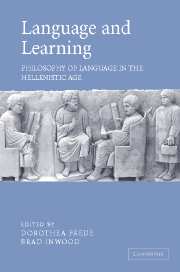Book contents
- Frontmatter
- Contents
- List of contributors
- Preface
- List of abbreviations
- Introduction
- 1 The Stoics on the origin of language and the foundations of etymology
- 2 Stoic linguistics, Plato's Cratylus, and Augustine's De dialectica
- 3 Epicurus and his predecessors on the origin of language
- 4 Lucretius on what language is not
- 5 Communicating Cynicism: Diogenes' gangsta rap
- 6 Common sense: concepts, definition and meaning in and out of the Stoa
- 7 Varro's anti-analogist
- 8 The Stoics on fallacies of equivocation
- 9 What is a disjunction?
- 10 Theories of language in the Hellenistic age and in the twelfth and thirteenth centuries
- References
- Index nominum et rerum
- Index locorum
4 - Lucretius on what language is not
Published online by Cambridge University Press: 23 November 2009
- Frontmatter
- Contents
- List of contributors
- Preface
- List of abbreviations
- Introduction
- 1 The Stoics on the origin of language and the foundations of etymology
- 2 Stoic linguistics, Plato's Cratylus, and Augustine's De dialectica
- 3 Epicurus and his predecessors on the origin of language
- 4 Lucretius on what language is not
- 5 Communicating Cynicism: Diogenes' gangsta rap
- 6 Common sense: concepts, definition and meaning in and out of the Stoa
- 7 Varro's anti-analogist
- 8 The Stoics on fallacies of equivocation
- 9 What is a disjunction?
- 10 Theories of language in the Hellenistic age and in the twelfth and thirteenth centuries
- References
- Index nominum et rerum
- Index locorum
Summary
In his Letter to Herodotus (75f.), Epicurus offers a strikingly non-teleological theory of the origin of (spoken) names, the first phase of which (75) is emphatically and explicitly naturalistic:
In consequence [one must suppose] that names too did not come into being at the start by imposition, but that the very natures of men, people by people, undergoing particular experiences and getting particular impressions, expelled in a particular way the air which was moulded by each experience and impression, according too to the variation between the peoples produced by the places [they lived in].
The details are much contested, but the general picture seems to be the following: in early humans, involuntary vocal responses were produced indirectly by the external environment, directly by internal psychophysical states themselves caused by external objects. These vocalisations were shaped both by the different objects which came to be named by these vocalisations, and by the physiological and psychophysical idiosyncrasies of the populations of different regions. The notion that people may be differently constituted not only physiologically, but also psychologically, according to their physical environment, was, of course, a fairly common one in antiquity, and not at all a ‘curious idea’, as Bailey describes it (1926: 248, ad Ep. Hdt. 75.8). In brief, that different things have different names within languages, and that the same things have different names in different languages, are alike explained by differences in both the constitutions and the environments of different peoples, who come to make up different language communities.
- Type
- Chapter
- Information
- Language and LearningPhilosophy of Language in the Hellenistic Age, pp. 101 - 138Publisher: Cambridge University PressPrint publication year: 2005
- 7
- Cited by



